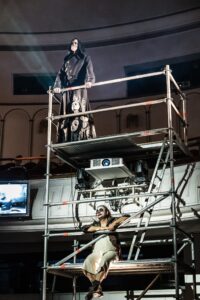
Opera Profile: The Story of Viktor Ullman’s ‘Der Kaiser von Atlantis’
By John Vandevert(Photo Credit: Joerg Metzner)
During World War II (1939-1945), dictator Adolph Hitler of Germany instituted the practice of concentration camps and ghettos in order to try and exterminate non-Arayan populations including gypsies, gays, Jews, Russians, and many ethnic groups. Thankfully, he did not succeed. But, the lasting scars of Nazi Germany have forever shaped our understanding of each other and mankind as well.
Despite the horrifying conditions in the camps and ghettos, artistic life was somehow able to keep going. Thanks to the work of researchers, inheritors of documents, and the bravery of those in the camps, we know that there were many orchestras and opportunities to hear music. Singing was often a forced activity but concerts were also a regular occurrence, with new music being composed despite the horrible conditions. The harrowing stories of composers using the back of scrap paper and miscellaneous documents, charcoal to write symphonies, and the road to which these documents survived is a testament to the human will to live, to thrive, and to see day light.
Classical music was an especially prevalent genre in the concentration camps. The children’s opera Brundibár by Hans Krása (1899-1944) and Quartet for the End of Time by Olivier Messiaen are two of the most important works from this brutal time. But, it is Austrian composer Viktor Ullmann (1898-1944) and his opera, “Der Kaiser von Atlantis“ (The Emperor of Atlantis) that we’ll talk about today.
The Opera
“Der Kaiser von Atlantis” is a one act opera with four scenes and centers around the dictatorial aspirations of the Emperor of Atlantis. The libretto was written by fellow prisoner Peter Kien (1919-1944), a writer and poet known for his wit and sketches of the Theresienstadt ghetto. The camp was considered the “model ghetto” by officers, but it was more a concentration camp. Ullmann was employed as a music reviewer in the camp and found himself with lots of extra time to compose.
Ullmann was a strong believer in anthroposophy, a philosophy that argues humans can develop the intellectual ability to connect to spiritual dimensions through decisive study and thinking. However, the opera is more so a satirical jab at Hitler’s idealistic vision for the Third Reich, the ignorance of death and dying, and the seemingly endless warfare of Europe. The Emperor’s “game” eventually fails and awakens him to a new respect for human life.
Ullmann began work on the opera at the beginning of World War I but seriously got going during the summer of 1943, finishing shortly after in November. Because deportations were a common occurrence, there was little guarantee about who would be able to play the music. Thus, the orchestra was scored for an oblong 13 players, with the vocal parts written for specific singers. There is also no chorus because of the precarious nature of the ghetto.
Performances of new works were never guaranteed but that did not stop Ullmann from composing. Nevertheless, during rehearsals of the work in the summer of 1944, the work was abruptly censored and banned from rehearsing. The reason was that the Emperor was taken to be a satirization of Hitler. Both Ullmann and Kien were later murdered at the Auschwitz-Birkenau camp in 1944. Fortunately, on December 16th, 1975, the opera received its formal premiere at the Netherlands Opera in Amsterdam, and was recorded in 1990 by Decca records.
The Road to the Archive
The road of the work out from the grip of Nazi occupation to an archive in Switzerland is a convoluted and elongated tail but it will be summarized here. The opera was originally etched on the back of a deportation list and thus was already ad hoc. A lack of paper forced many composers to get creative with how they put their music down.
In 1944, when Ullman and Kien were deported, Ullmann had made sure to entrust his score to Dr. Emil Utitz, Jewish philosopher and Theresienstadt librarian. After WWII’s conclusion, Utitz gave the manuscript to Dr. Hans Gunther Adler, Jewish writer and poet, taking them with him to England in 1947 due to the Communist takeover of Czechoslovakia.
Adler’s influence was not just as a handler of Ullmann’s documents but actively participated in the opera’s premiere in 1975. The two were also close friends, Ullmann setting some of Adler’s poems into songs in the camp.
The work was later handed over to the Goetheanum in Switzerland on long-term hold. However, at some point they were given to the 20th and 21st-century musical archive Paul Sacher Stiftung illegally, although an official contract was begun in 2021. As of 2023, the work, many studies of the work, and related compositions are now accessible.
Listen
Categories
Opera Wiki

